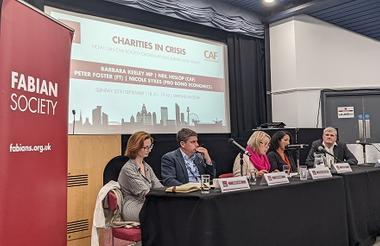Charities have an in-depth understanding of the communities they serve and should be “key influencers” in decisions on policy and legislation, delegates at the Labour Party Conference heard.
Barbara Keeley, Labour shadow charities minister, was speaking yesterday at a fringe event organised by the Fabian Society and the Charities Aid Foundation (CAF).
In her opening remarks, Keeley said that the charities’ response to the Covid-19 pandemic was “magnificent”, as they were able to deal with surges in demand while facing falling income and volunteer numbers.
She went on saying that charities are once again in crisis due to the cost-of-living squeeze.
“I want to make the point strongly at this difficult time that the insights and experience [of] organisations and groups which work in the community and advocate for people in the greatest need are incredibly valuable,” she said. “We shouldn’t lose sight of that.”
“This knowledge and experience mean that civil society organisations should be key influencers in decisions about policy and legislation. In the last decade, I don’t think you’ve been the key influencers that you should have been because you haven’t been allowed to be.”
Strong relationship between government and sector needed ‘more than ever before’
Keeley said: “If we take just one example, debt-advice charities, food banks and food hubs are the frontline of people’s experience of the cost-of-living crisis. It’s quite clear that our government and Treasury should be benefiting from their insights.”
She continued: “We now have a government headed by a prime minister and a chancellor who see the world very differently. [Last] week has really changed things so it’s even more important to make sure that the voice of those on the lowest incomes or those with the greatest social needs is heard.
“Charities must have their priorities heard because in communicating the messages to those with the power to change things, they’re amplifying the voices of their beneficiaries and that’s very valuable. I do believe that a strong relationship between civil society and politicians is more critical now than ever before. As tough as it is right now, it’s more critical.”
Government support will be ‘necessary’ in coming months
Also speaking on the panel was Neil Heslop, chief executive officer of CAF. He said the government must provide more funding to charities in the coming months.
“We saw in the immediate aftermath of the pandemic the chancellor’s intervention with a package of £750m for the charity sector. There’s a recognition that that money was put to good use the National Audit Office felt in terms of the effectiveness with which that money was deployed,” he said.
“It translated into significant impact but I believe that it will be necessary for the chancellor to bring forward some direct support and awareness to that in the next few months.”
‘Growing pay gap’ between sector and rest of the economy
Another panellist, Nicole Sykes, director of policy and communications at the think tank Pro Bono Economics, talked about the charity workforce challenge, an issue that has been overshadowed by other ongoing crises.
“You have businesses challenging the sector when it comes to employment in terms of the move towards private sector purpose. That key differentiator that we often use to hire people and then pay them less as part of that, we’re kind of losing out on that now,” she said.
“We also had flexible working [which] is a key differentiator for the sector and you're seeing a lot more of the economy now offering that. So some of the key differentiators that we had to attract talent are no longer as strong.
“But we’re seeing a growing pay gap between the charity sector and the rest of the economy so that really challenges our workforce model. Our workforce model is also being challenged by what’s happening in long-term declines in formal volunteering, and with people retiring later in life [and] with more women in work. Those kinds of volunteering rates aren’t going to change, they’re driven by societal challenges as well as how the sector operates.”
She also said that the sector has “professionalised over the last decade because we’ve had to” and that employment in the sector has grown about twice the rate of the rest of the economy.
“We’re a much bigger employer than we used to be. So how do we get the government to be a strategic investor in the sector’s productivity much in the same way it does in the private sector? Productivity might be a scary word, but how do we convince the government that if they want to invest in the skills of the private sector, they should also be investing in our skills?”
Related articles












